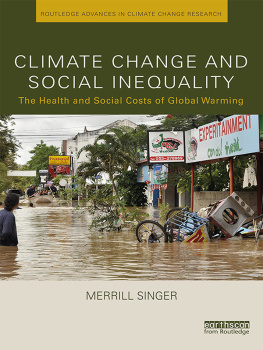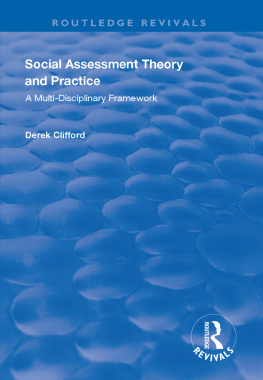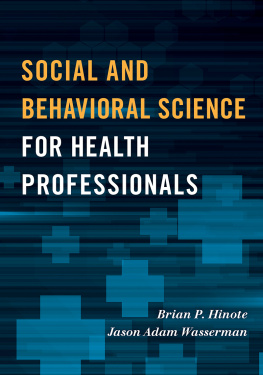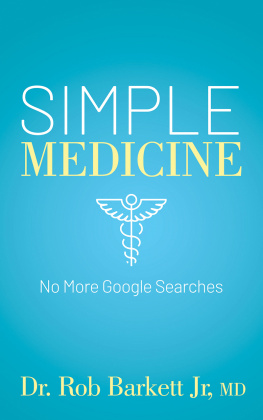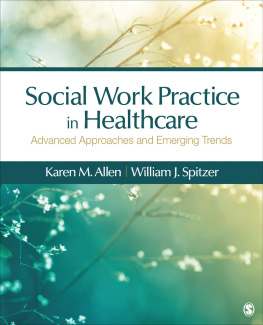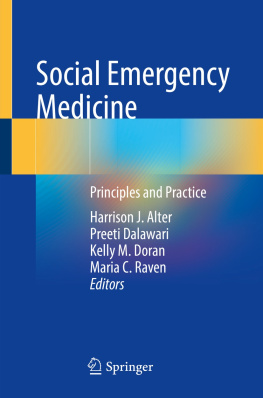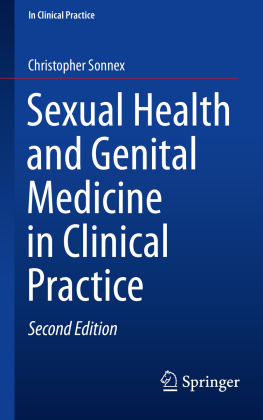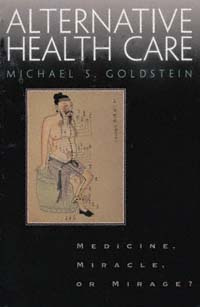
p.i
SOCIAL JUSTICE AND MEDICAL PRACTICE
How do we understand and respond to the pressing health problems of modern society? Conventional medical practice focuses on the assessment and clinical treatment of immediate health issues presented by individual patients. In contrast, social medicine advocates an equal focus on the assessment and social treatment of underlying social conditions, such as environmental factors, structural violence, and social injustice.
Social Justice and Medical Practice examines the practice of social medicine using extensive life history interviews with a physician practicing this approach in marginalized communities. It presents a case example of social medicine in action, demonstrating how such a practice can be successfully pursued within the context of the existing structure of twenty-first-century medicine. In examining the experience of a physician on the frontlines of reforming healthcare, the book critiques the restrictive nature of the dominant clinical model of medicine and argues for a radically expanded focus for modern-day medical practice.
Social Justice and Medical Practice is a timely intervention during a period when even advanced healthcare systems are facing multiple crises. Lucidly written, it presents a striking alternative and is important reading for students and practitioners of medicine and anthropology, as well as policy makers.
Merrill Singer is a professor in the departments of anthropology and community medicine, at the University of Connecticut, USA. A medical and cultural anthropologist, his research focuses on the social determinants of health inequality, the critical biosocial nature of health, and environmental health. He is recipient of a number of prizes, including the Rudolph Virchow Professional Prize, the Society for Medical Anthropologys Career Award, and the George Foster Memorial Award for Practicing Anthropology.
Rebecca Allen completed a BA in Anthropology at the University of Connecticut, USA, where she was president of the universitys chapter of Lambda Alpha, the National Collegiate Honors Society for Anthropology. She is now a medical student at George Washington University, USA.
p.ii
Advances in Critical Medical Anthropology
Series Editors: Merrill Singer and Pamela Erickson
This book series advances our understanding of the complex and rapidly changing landscape of health, disease, and treatment around the world with original and innovative books in the spirit of critical medical anthropology that exemplify and extend its theoretical and empirical dimensions. Books in the series address topics across the broad range of subjects addressed by medical anthropologists and other scholars and practitioners working at the intersections of social science and medicine.
Titles in series
Drug Effects: Khat in Biocultural and Socioeconomic Perspective
Lisa L. Gezon
Syndemic Suffering: Social Distress, Depression, and Diabetes among Mexican Immigrant Women
Emily Mendenhall
Health Policy in Crisis: Access to Abortion in the Context of Austerity
Bayla Ostrach
Thinking Through Resistance: A study of public oppositions to contemporary global health practice
Nicola Bulled
Social Justice and Medical Practice: Life History of a Physician of Social Medicine
Merrill Singer and Rebecca Allen
www.routledge.com/Advances-in-Critical-Medical-Anthropology/book-series/ACMA
p.iii
SOCIAL JUSTICE AND
MEDICAL PRACTICE
Life History of a Physician of
Social Medicine
Merrill Singer and Rebecca Allen
p.iv
First published 2018
by Routledge
711 Third Avenue, New York, NY 10017
and by Routledge
2 Park Square, Milton Park, Abingdon, Oxon, OX14 4RN
Routledge is an imprint of the Taylor & Francis Group, an informa business
2018 Taylor & Francis
The right of Merrill Singer and Rebecca Allen to be identified as authors of this work has been asserted by them in accordance with sections 77 and 78 of the Copyright, Designs and Patents Act 1988.
All rights reserved. No part of this book may be reprinted or reproduced or utilised in any form or by any electronic, mechanical, or other means, now known or hereafter invented, including photocopying and recording, or in any information storage or retrieval system, without permission in writing from the publishers.
Trademark notice : Product or corporate names may be trademarks or registered trademarks, and are used only for identification and explanation without intent to infringe.
Library of Congress Cataloging-in-Publication Data
A catalog record for this book has been requested.
ISBN: 978-1-62958-425-6 (hbk)
ISBN: 978-1-62958-426-3 (pbk)
ISBN: 978-1-315-11227-5 (ebk)
Typeset in Bembo
by Swales & Willis Ltd, Exeter, Devon, UK
p.vi
William Tootle, graduate student, Department of Anthropology, University of Connecticut, conducted and transcribed interviews for this project with colleagues of Bruce Gould. We thank him for his generosity and notable contributions to this book. The authors would also like to thank the colleagues of Bruce who were willing to take the time out of their busy schedules to be interviewed for this book. Life may be short, but Bruces life has been both broad and full, and it has been a pleasure getting to learn about it.
p.1
The long, hard winter of 201415 was finally showing signs of retreating into history as Becca Allen and I drove the short distance from the campus of the University of Connecticut to the site of E. O. Smith High School in Storrs, CT. We had come to hear a talk by celebrated physician/anthropologist and author Paul Farmer, co-founder of Partners in Health and an individual who has emerged both as a very prominent public figure because of his tireless efforts on behalf of the health needs of the worlds poor, but also as the best-known anthropologist of our time. Our plans were to meet up with Bruce Gould, the physician and University of Connecticut professor whose life and work is the focus of this book.
Although the school sits immediately next to and is partially surrounded by UConn, as the university is colloquially known, I had never been to E. O. Smith before. The high school is named after Edwin O. Smith, a Connecticut politician who served for almost three decades in the Connecticut House of Representatives. Previous to his lengthy political career, however, Smith had been president of Connecticut Agricultural College, which in 1939 was renamed the University of Connecticut. The relationship between the two educational institutions continues into the present. E. O. Smith students are allowed to take classes at the university free of charge, and receive credit on their academic records for both institutions. Additionally, UConns Community School of the Arts partners with E.O. Smith to provide a non-traditional educational experience for students who need a smaller and more personalized instructional setting. Louis F. DeLoreto, a UConn graduate, is the principal of the high school. Thus there is a flow of students between the two institutions, and we joined that stream to hear Paul Farmers talk.
To our surprise, we were actually the first to arrive at the public event, and as a result, the three of us were able to claim seats close to the auditorium stage, near the podium where Farmer would speak. Around us, a growing throng of high school and university students, teachers from the two schools, and community members gathered, several hundred strong. Students from the high school had come as part of the E.O. Smith READS program, which selected as its focus for 201415 Tracy Kidders (2004) book Mountains Beyond Mountains: The Quest of Dr. Paul Farmer, A Man Who Would Cure the World . The program, a school-wide initiative, is modeled after UConn READS, further emphasizing relations between the now-sprawling university and the high school it partially encircles. As part of the program, students were given reading assignments and projects based on the award-winning biography in their grades 912 English classes, as well as opportunities to participate in conversations about the book and related issues in their other courses. The title of Kidders book comes from a Haitian proverb: beyond mountains there are mountains, which has been interpreted to mean that as you solve one problem, another problem looms before you, and so you move on in your life and try to solve that problem as well. In short, the challenges of life are great, but we all must do what we can while we are here on Earth by leading meaningful lives that deeply engage the often punishing social world around us, most notably, in the case of Paul Farmer, by confronting the health problems created around the world by massive social inequality and blatant injustice. Of Farmer, Kidder (2003), a Pulitzer Prize awardee, wrote in the book that he is


